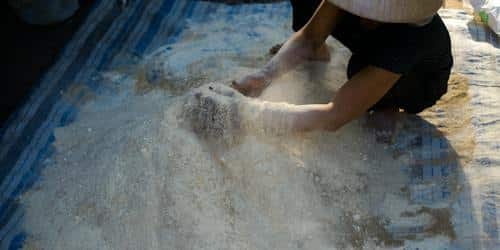Africa’s most populous nation and richest economy is Nigeria. Nigeria’s enormous market potential and plethora of business options draw more and more entrepreneurs to invest and establish factories, particularly those that process cassava. Large-scale factories that manufacture cassava flour are nonetheless uncommon. In order to build a brand, this is the ideal time to open a cassava flour processing business in Nigeria. We’re going to speak about how to launch a Nigerian cassava flour processing company today.
What is Cassava Flour?
One type of flour produced from the starchy root vegetable cassava is called cassava flour (Manihot esculenta). It’s a popular gluten-free substitute for wheat flour in Nigerian and African recipes and goods.
What is the Cassava Flour Production Business in Nigeria About?
The white, powdery product known as cassava flour is made from cassava roots. Manihot esculenta is the scientific name for cassava. In several nations, particularly Nigeria and Africa, it is a staple diet. The process of turning cassava roots into flour, which can be used for baking, snacking, and thickening soups and stews, is the business of producing cassava flour.
The cassava roots must be peeled, cleaned, grated, fermented, dried, and ground in order to produce cassava flour. Sufficient processing methods are required to create premium cassava flour that satisfies global requirements.
Studies have been conducted to enhance the methods used in the production of cassava flour and boost the productivity of cassava crops. The introduction of high-yielding cassava cultivars and enhanced processing methods as a result of these efforts has increased the output of cassava flour in Nigeria and throughout Africa.
There is a lot of room for expansion and export possibilities in the cassava flour production industry. Because it is devoid of gluten and has a low glycemic index, cassava flour is highly sought after in the global market and may be used to manufacture a wide range of culinary products. As a result, making investments in Nigeria and other African countries that produce cassava flour might be financially rewarding. In case you don’t want to go for cassava flour farming, you can also try cassava farming using our detailed guide here.
Benefits of The Cassava Flour Production Business in Nigeria
There are numerous advantages to running a cassava flour business; some of them are as follows:
- Employment generation: The production of cassava flour offers employment opportunities to people at many points along the value chain, including as farmers, processors, marketers, and distributors.
- Income growth: By providing farmers and processors with income, the cassava value chain helps to reduce poverty.
- Food security: In Nigeria and throughout Africa, cassava is a staple crop. By reducing reliance on imported wheat flour, cassava flour production contributes to food security.
- Opportunities for export: Nigeria is the world’s top producer of cassava, and there is a market for exporting cassava flour to other nations.
- Reduced reliance on imports: Nigeria may save foreign exchange and support domestic industry by reducing its reliance on wheat flour imports thanks to cassava flour.
- Better nutrition: Since cassava flour is gluten-free, it can be used to make wholesome meals for those who have gluten sensitivity or celiac disease.
- Reduced production costs: Cassava flour is more reasonably priced for consumers since it is less costly to produce than wheat flour.
- Value addition: The manufacturing of cassava flour increases the crop’s worth and increases profits for growers and processors.
Types Of Cassava Flour In Nigeria
In Nigeria, businesses that produce cassava flour can choose from a variety of cassava flour varieties. Among these kinds are a few of them:
- Fermented cassava flour: The nutritional profile and digestibility of fermented cassava flour have been enhanced. In West and Central Africa, it is frequently used to prepare regional specialties including akpu, gari, and fufu.
- Cassava flour without fermentation: This variety of flour is produced from raw cassava roots without any kind of fermentation. It is frequently utilized in the baking of baked products like pastries, cakes, and bread.
- High-quality cassava flour (HQCF): Cassava flour that has undergone a particular processing technique to enhance its quality and lower its cyanide concentration is known as high-quality cassava flour (HQCF). It is frequently used to make bread, noodles, and other baked foods in place of some of the wheat flour.
- Low-quality cassava flour (LQCF): This type of cassava flour is typically utilized in the manufacturing of animal feed and is made from low-quality cassava roots.
- Sweet cassava flour: Unlike bitter variants, sweet cassava flour contains less cyanide. It is made from these cassava kinds. It is frequently utilized in the creation of snacks and baked items.
- Cassava flour that has been blended: This is a blend of cassava flour with other flours, such rice, wheat, or maize flour. It is frequently used to make baked goods in place of some of the wheat flour.
How To Start The Cassava Flour Production Business in Nigeria: Step-By-Step Guide
Here is a step-by-step guide to help you start a profitable cassava flour-producing business in Nigeria:
#1. Choose the ultimate goods you’ll need to process cassava.
The primary processes for processing cassava in Nigeria today are processing cassava starch, processing garri; processing cassava chips (either for direct sale or additional processing into ethanol or biomass fuel); and processing cassava flour. When you first launch your firm, you should be very clear about your goals and end goods. The first step is this. In Nigeria, cassava flour is a staple food with a sizable local market. This article primarily uses the processing of cassava flour as an example, although it also applies to other end products.
#2. Create a brief business strategy for your Nigerian cassava flour production plant.
A company’s business plan serves as a guide for the establishment, management, and prosperity of the enterprise. Therefore, you should create a detailed business strategy to estimate the costs of investment before launching a cassava flour manufacturing plant, particularly if it will be large-scale. The cost of labor, raw materials, equipment, land, power, etc. is mostly included in the investment cost.
#3. Rich source of raw materials
The quantity of cassava raw materials you need will depend on your production needs and how many days your plant can operate. Since Nigeria is the world’s leading producer of cassava, raw materials shouldn’t be a major concern. If you own a cassava plantation, that would be ideal; if not, you can purchase cassava from nearby farmers.
#4. Select an appropriate site to establish a facility in Nigeria to produce cassava flour.
The location should be near the cassava farm; this is the most crucial factor. It can fully utilize raw materials in addition to avoiding needless shipping costs. due to the fact that, compared to other main root and tuber crops, cassava roots are far more perishable. The processing deadline is one day. The factory area should also be large enough to fit every processing unit used to make cassava flour.
Of course, leasing property for the development of a factory is an option as well. The factory’s location is a critical consideration. You must take into account the following circumstances:
- If there is easy access to transportation. How practical it is to transport both finished goods and raw materials.
- the plant’s close proximity to the market and raw resources. To cut down on transportation expenses, it is advisable to select a site that is close to the cassava plantation and product market.
- Whether there are sufficient water and electricity supply
Given the aforementioned circumstances, the suburbs would be the ideal site for the cassava flour production facility.
#5. Look for a reputable manufacturer and provider of equipment to purchase a cassava flour processing machine.
This is a really significant matter. A reliable and long-lasting cassava flour processing factory can be ensured by a reputable manufacturer and supplier of equipment. There is a strict criterion for cassava flour quality. Thus, you ought to purchase a fully automated line for producing cassava flour. Undoubtedly, you may still get these devices based on your needs, even if you have a tight budget. This is the cassava flour processing equipment that you ought to purchase:
Dry sieve: Paddle Washing Machine for Cassava; Plate and frame filter press; Rasper; Cassava starch sieving Machine; Flash Dryer A packing machine.
#6. Employ laborers in factories
You must engage manufacturing workers and supervisors since labor is needed for equipment shipping, installation, commissioning, and operation after it is purchased.
#7. Get the required business licenses and permissions
Once the market survey is finished, you might think about launching the cassava flour processing company. Prior to opening for business, you should ascertain whether commercial licenses and permits are necessary for the processing of cassava flour and obtain them.
#8. Examine the profitability of your factory that processes cassava flour and grow the market.
Profit is what a firm must aim for. Thus, you ought to examine your cassava flour processing factory’s profit margin. Many clients informed us that the profits from the cassava flour processing industry are very large in the interim. Once production is complete, you can sell your cassava flour for a profit to market women, retailers, and supermarkets. Should you possess sufficient capability, you may also opt to export to foreign nations.
How To Process Cassava Flour In Nigeria
Nigerian cassava flour processing and packaging involves the following steps:
- Harvesting: When the cassava plant’s roots are developed and prepared for processing, they are harvested.
- Peeling: The white interior flesh of the cassava root is exposed once the outer layer is removed.
- Grating: Using a grater or a motorized grinder, the peeled cassava roots are ground into tiny bits.
- Pressing: Either a mechanical or hydraulic press is used to press the grated cassava in order to extract any remaining moisture.
- Drying: Either the sun or a mechanical drier is used to remove moisture from the pressed cassava.
- Milling: A milling machine is used to grind the dried cassava into flour.
- Sieving: Next, any lumps or contaminants are taken out of the cassava flour by sieving it.
- Packaging: To be distributed and sold, the cassava flour is wrapped in bags or other containers.
Using premium, food-grade packaging materials is crucial when storing cassava flour to keep it uncontaminated and fresh for as long as possible. The product name, the manufacturing date, and any other pertinent details should be written on the packaging.
Challenges Of The Cassava Flour Production Business in Nigeria
A business cannot exist without difficulties. The most crucial thing, though, is to be aware of these obstacles and take every precaution to avoid them. Among these difficulties are the following:
- Seasonal variations in supply and demand: The availability of raw materials and the demand for completed goods are subject to seasonal variations that can affect the output and profitability of cassava flour production.
- Insufficient infrastructure: Inadequate storage facilities and bad road systems can cause cassava roots and completed goods to decay, costing producers of cassava flour money.
- Limited access to credit: Credit availability is a problem for many cassava flour manufacturers, making it challenging to grow their businesses or make capital investments in new machinery.
- Low productivity: Nigeria and Africa’s ability to produce cassava flour is limited by low yields per hectare and antiquated processing techniques.
- Lack of skilled labor: It may be challenging to maintain consistent quality and reach production targets in the cassava flour industry due to a lack of skilled workers.
- High input costs: The production of cassava flour may become less profitable as a result of the high costs of inputs like pesticides and fertilizers.
What is the Demand for Cassava Flour in Nigeria?
There is a 500,000 metric ton demand for cassava flour for bread, biscuits, and snacks, but only 15,000 metric tons are available. According to PwC, Nigeria would require 1.2 million hectares of land and approximately 28.3 million metric tonnes of fresh cassava root cultivated annually in order to meet its demand.
Is Cassava Flour Profitable?
Table 5’s NPM value of 34.15% and ROI value of 51.81% demonstrated how profitable the home-scale industry’s cassava flour production was.
Is Cassava Flour in Demand?
It is projected that the global market for cassava flour will grow significantly between 2023 and 2030. The market is likely to expand throughout the estimated horizon in 2023 due to the stable growth rate and increasing adoption of tactics by major players.
How Much is a Bag of Cassava Flour in Nigeria?
The weight of a paint rubber bucket filled with cassava flour is about 3 kg. In Nigeria, a paint made from cassava flour typically costs 2,500 naira. Depending on the previously mentioned parameters, the typical cost of a bag (generally 50kg) of cassava flour in Nigeria varies between around 35,000 and 40,000 Naira.
What is Cassava Flour Best for?
In the culinary sector, cassava flour is a very adaptable product that may be used in a wide range of baked goods, tortillas, oatmeal, pancakes, and gluten-free spaghetti and pizza. It is occasionally used by manufacturers to thicken ice cream, sauces, and salads.
Conclusion
Once everything mentioned above is ready, you can launch your cassava flour processing company. You don’t have to be concerned about cassava flour sales in Nigeria. Because the manufactured cassava flour can be shipped to nearby African nations as well as the global market, in addition to being sold to Nigeria’s local bakeries and other food processing businesses. The use of cassava flour in place of wheat flour to make bread is becoming more and more common.
- Cassava Farming in Nigeria: The Ultimate Guide
- WHITE BREAD BRANDS: The Best Picks for 2023 & Free Tips
- ROOT BEER BRANDS: The Best List of Root Beer Brands to Follow in 2023, Updated!!!
- What Is Garri: Complete Business Guide 2023
- FLOUR PROCESSING BUSINESS: Cost breakdown & How to start tips (+ Detailed Guide)






